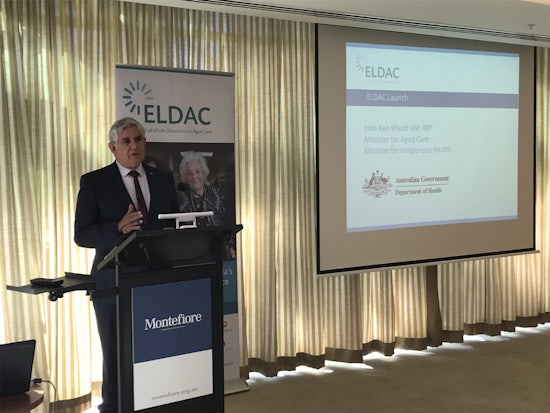End of life care project engages in second phase
Additional initiatives, new partnerships, technology innovation and policy roundtables are all part of the second phase of the End of Life Directions for Aged Care (ELDAC) project, which was launched in Sydney late last week (15 June).

Minister for Aged Care Ken Wyatt launching phase two of the ELDAC project in Sydney (Source: ELDAC)
A joint venture by the Australian Government and a consortium of eight partners comprising of Australia’s leading universities, and peak industry bodies, the project aims to improve the care of older Australians, with phase two set to boost the existing ELDAC resources.
Federal Minister for Aged Care Ken Wyatt launched the second stage, which includes a new website, that he says provides valuable palliative care and advance care planning resources.
“The End of Life Directions for Aged Care website provides a one-stop resource for this crucial service, whether in residential aged care or at home,” he says.
“The consortium has also developed five toolkits that provide practical information and support people working in aged care and in primary health care.
“As well as this, the consortium operates a telephone and web-based support service to help aged care workers, nurses and general practitioners with information about end of life care and local services.”
Prior to the launch of the second phase, ELDAC Project Director and Queensland University of Technology (QUT) Professor Patsy Yates said the $15 million project was progressing well, and is already improving palliative care and advance care planning services for older Australians.
She adds that a “major component” of the second phase is to provide coordination and advisory services, with the project developing communication pathways and collaborative team working arrangements connecting aged, primary and palliative care services.
“A significant part of ELDAC [phase two] being launched… is our emphasis on building service partnerships,” she explains.
“Designed to address the barriers to optimal care at the end of life, our toolkits together with our consultation and advisory services, will assist providers to work across traditional boundaries of care.
“The ELDAC project is improving care of aged residents and home care clients across metropolitain, rural and remote areas of Australia.
“This is supported by the creation of local and regional service partnerships all supported by resources including ELDAC’s evidence-based Working Together Toolkit.”
Professor Yates says technology also has a key role to play in supporting the system change in aged care, noting that phase two includes the development of a technology prototype to find and track meaningful data about care of clients and residents at the end of life.
She says a series of policy roundtables attended by experts in the field will examine available evidence and make recommendations on a range of issues to ensure the aged care workforce is well prepared to provide palliative care to older people now and into the future.
“These roundtables will focus on funding mechanisms, the aged care workforce and other key policy matters that will enable quality palliative care for older Australians,” she explains.











![The new Aged Care Act exposure draft is slated for release in December of 2023, but advocates hope to see it rolled out on January 1, 2024. [Source: Shutterstock]](https://agedcareguide-assets.imgix.net/news/articles/wp/agedcareact__0811.jpg?fm=pjpg&w=520&format=auto&q=65)












Comments